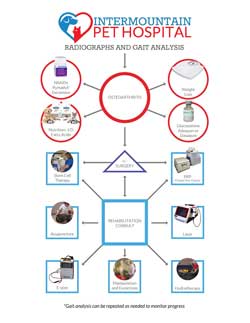Some pets will experience joint and bone problems in their lives. Sometimes, the problem will be easy to see (e.g., a broken leg). Other times, the only warning sign could be that your pet is moving slower or just doesn't seem right.
Some problems may require surgery. In these cases, Intermountain Pet Hospital has the tools and the skills to get your pet back on their feet. At our state-of-the-art facility, we can diagnose and treat orthopedic problems as quickly, effectively, and painlessly as possible.
Common Orthopedic Problems
Common orthopedic problems might include:
- Joint problems (arthritis)
- Bone issues
- Bone disease
- Fracture repair
- Hip and elbow dysplasia
- Back trauma
- Knee trauma
- Cruciate ligament (ACL) injury
How IPH Handles Orthopedic Problems
Intermountain can handle most of an animal's orthopedic problems in-house. We start by running diagnostic tests to make sure that the operation and anesthesia won't harm your pet. If we find underlying issues, we'll take care of those and reschedule the surgery for a later time.
Before surgery, we'll give your pet medication to make him or her comfortable. A technician will keep an eye on your pet's vital signs during the procedure. If any changes arise, the veterinarian in charge will take care of them before continuing.
Once your pet is ready to go home, we'll give you detailed instruction to help guide you through his or her post-surgery care. If we think follow-up appointments are necessary, we'll schedule those to ensure that your animal friend recovers fully.
As your pets get older, serious health issues may arise. One of them is arthritis, a chronic and painful, condition that could impact an animal's ability to move.
Intermountain Pet Hospital understands that arthritis can affect animals differently. Instead of a one-size-fits-all treatment, we examine your pets to understand the precise source and severity of their pain. This allows us to develop a treatment plan specifically for them.
Diagnosing and Treating Arthritis in Your Pets
Diagnosing and treating arthritis in your pet starts with taking X-rays. We also conduct a gait analysis, which looks at how your pet moves. This enables us to get an idea of where he or she feels pain.
 From here, we could recommend several different treatment options. These include:
From here, we could recommend several different treatment options. These include: